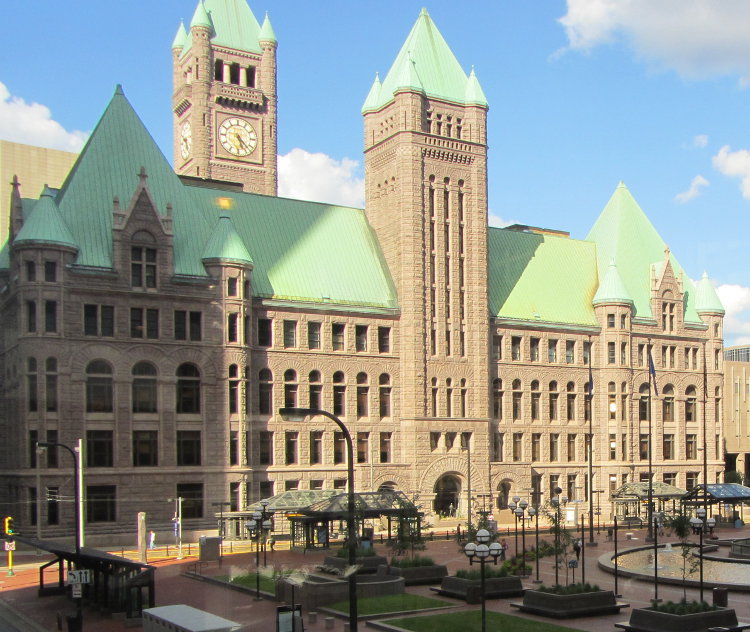Minneapolis Passes Open Data Policy
At about noon yesterday, Minneapolis became the 16th city in the United States to enact an Open Data Policy. This policy is both a significant step forward in the accessibility of Minneapolis city government, and a necessary evolution of the city’s work via innovation, engagement, trust, and collaboration in the 21st century. It is both the result of a lot of hard work, and the foundation of more work to come from city leaders, city staff, private organizations, and the citizens of Minneapolis.

Image from Wikimedia/Jason Riedy - License
What the Policy Does
From the policy:
The purpose of this policy is to set guidelines for incorporating an open data framework into existing and future systems and procedures, and aid in determining what data sets should be made public, how to make the data sets public, and how to maintain the existing published data sets.
More specifically, the policy:
- Requires the creation of a city Open Data Portal within 120 days of passage of the policy (November 27th, 2014) that will host published datasets for download or API access, notify the public of changes to published datasets, make published datasets discoverable by external search engines, and provide a means for public feedback and discussion on open data policies and data set availability;
- Places responsibility on the city’s Chief Information Officer (CIO) (or designee) to manage and facilitate this policy;
- Establishes an Open Data Advisory Group welcoming Open Data Coordinators from each city department to coordinate open data activities;
- Requires an annual Open Data Compliance Report prepared by the CIO (or designee) and Open Data Advisory Group;
- Requires that IT contracts awarded after January 1st, 2015 be consistent with and promote this policy - that the city retains ownership and the ability to publish data impacted by awarded contracts;
- Provides a set of guidelines for IT and other city department responsibilities pertaining to open data; and
- Defines a legal disclaimer to accompany datasets made available on the city’s open data portal
Council Discussion and Vote
Despite being the last item for discussion in a fairly lengthy Council meeting, the Open Data Policy prompted some notable discussion among the City Council. Video of yesterday’s City Council meeting is available at http://mpls.dev.implex.net/?p=1991#.
Even before the policy came up for discussion, Council Member Reich proposed an amendment to the policy as submitted to the City Council (draft version here). Council Member Reich’s amendment converted some of the requirements imposed on city departments into advisements. This amendment stemmed from Council Member Reich’s concern that the Open Data Policy represented an unfunded imposition of actions by one city department onto other city departments. Some of these amendments eventually were included as proposed by Council Member Reich in the voted upon policy, while others were themselves amended by a proposal from Council Member Glidden to balance the need to not impose unfunded actions on departments with the need to support the Open Data Advisory Group as a means of coordination, lesson sharing, and discussion. The amended and voted upon version of the policy can be downloaded here.
Several City Council Members noted the policy as a first step for the city into open data, as well as the culture change that the policy will need to (and hopefully can) affect among city departments. Council Member Bender described the policy as a “moderate first step that reflects culture”. Council Member Glidden observed that the policy is an evolution of government sunshine laws, and recognized that the culture change required within the city will require significant time and effort. Noting the likely need for future revisions, Council Member Glidden posed the question of policy evaluation to CIO Otto Doll, who responded that evaluations and changes will be recommended by the Open Data Advisory Council, based on feedback from the public and changes in technology.
Public participation and innovation were also points of discussion. Members of the public that participated in the working group that drafted the Open Data Policy - Kirsten Murray of the University of Minnesota’s Center for Urban and Regional Affairs and Bill Bushey of Open Twin Cities - were thanked by Council Member Johnson and Otto Doll for their efforts. As an example of the innovative potential of the Open Data Policy, Council Member Johnson described a website he helped to build that presents the federal budget in an easier to understand format, based on spending data the federal government has been releasing through its own open data initiative. Council Member Bender noted the potential for innovation by private citizens by highlighting a website built by a Minneapolis resident to display restaurant health inspection results that had not previously been available to the public (this would be Tony Webster’s mplshealth.com (currently unavailable)).
With discussion and statements of support taken care of, the Council voted on the Open Data Policy. It passed unanimously.
Updates
- August 4th, 2014: The original version of this post referred to Council Member Elizabeth Glidden as the ‘Council Chair’, a position which does not exist. Council Member Glidden is the Vice-President of the City Council, and the Chair of the Council’s Committee of the Whole. This post has been updated to correct this error.